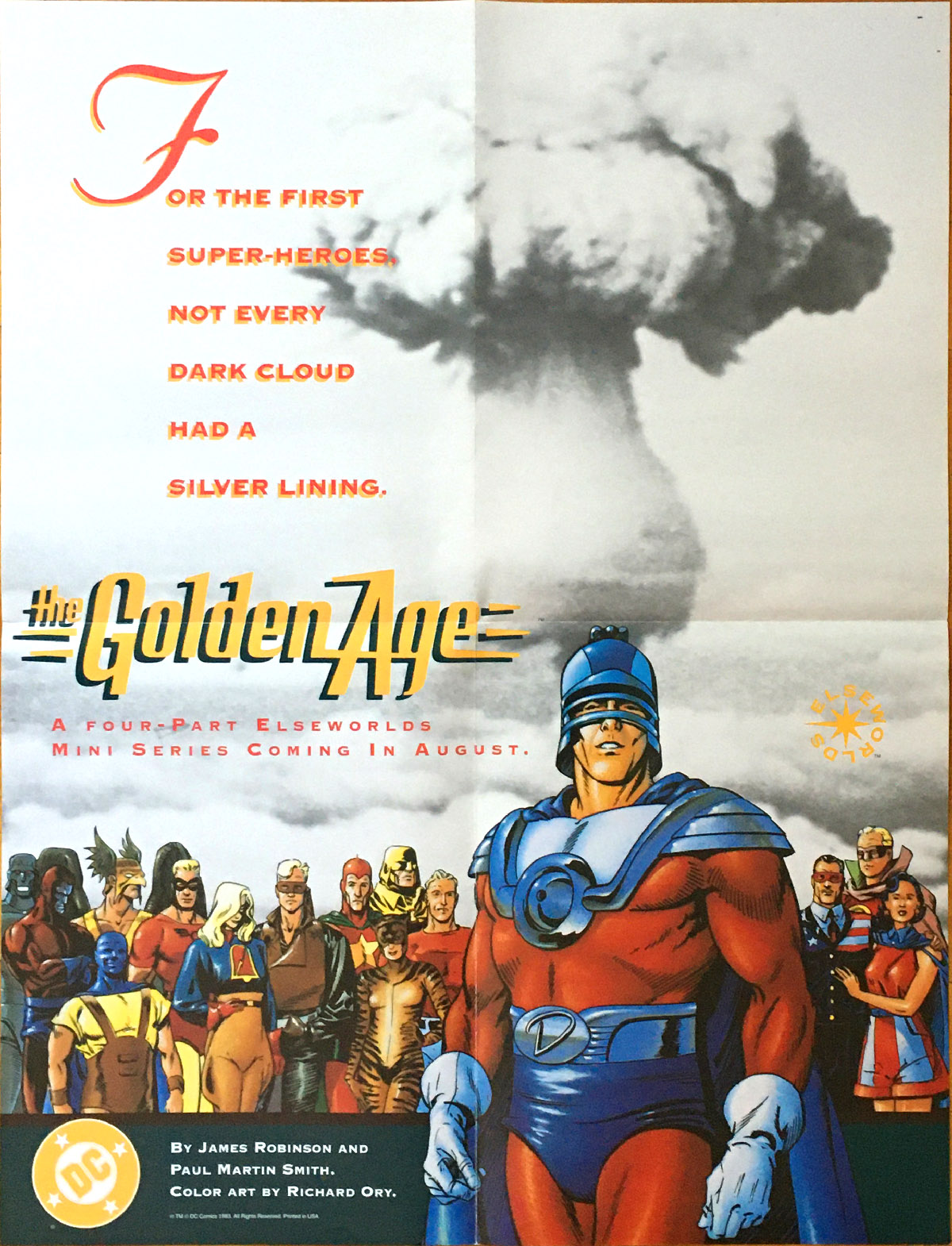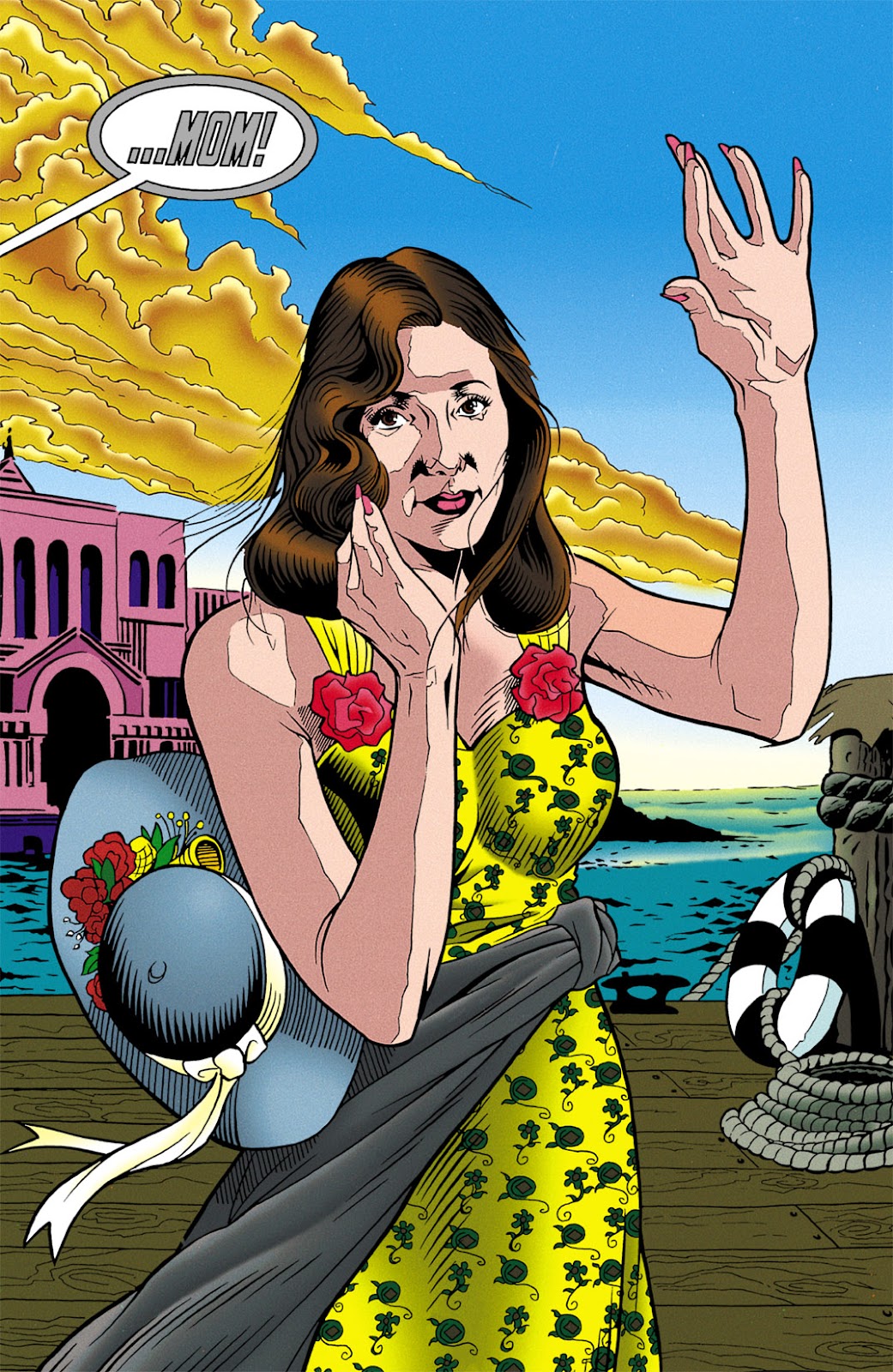#6 James RobinsonI think I first encountered James Robinson where everyone did: A1, from Atomeka.
What, seriously, you weren't reading that excellent anthology? Robinson had a Grendel story in there (issue #4, plus a second story). That was soon followed by his excellent Firearm, from Malibu's Ul;traverse line. For my money, it was the only really consistently good comic in the line, though others had some good issues and decent characters (Prime, The Strangers). It was, essentially, a detective series that had superheroes grafted on to it. The lead character is a private eye, who once worked for a government agency (The Lodge) that dealt with paranormals. He has no super abilities, just his sidearm, a jazzed up pistol. He's relocated to Southern California and he loves good books. It was a treat to read, mixing in elements of the hardboiled detective genre with 90s superheroes, but from a slightly more subversive British perspective (all the rage, in the early 90s) Like the rest of the Ultraverse, it didn't last long; but, it was filled with good stories and great discussions about books, on the letters page.
If that wasn't enough, in a short period of time, Robinson produced several very good Terminator mini-series, for Dark Horse, who were really kicking with the licensed material from the Aliens, Predator and Terminator movie franchises. Robinsons were some of the best Terminator stories and were way better than the sequels we got later. Then, there was his graphic novel, 67 Seconds, done with Steve Yeowell (of Zenith and Sebastian O fame), about a luxury airship, a journalist and a Nazi legacy. It was done via Marvel's Epic imprint and was a terrific piece of work. There was the first Grendel Tales mini-series, "Four Devils, One Hell," which really set the tone for the ones that followed, plus his own Illegal Alien, at Kitchen Sink, about an alien who lands in the UK, during the swinging 60s, with references to the pop culture figures of the era.
Robinson then produced the excellent Witchcraft mini-series, with Teddy Kristiansen (his collaborator on Grendel Tales), soon to be followed by one of my favorite works of the 90s, The Golden Age.

Yep, I was so jazzed for this that I had the promo poster, with that gorgeous Paul Smith art, as he channeled Alex Raymond, Reed Crandall and Lou Fine into the modern era.
Robinson reached right into my brain and pulled out the story I wanted to do, about a post-War look at superheroes, with HUAC, the Atomic tests, rampant paranoia and the descent into darkness that seemed to follow the war, in some circles. I had seen a bit of this in the Wild Cards series of novels and Paul Levitz had already worked in this circle in the JSA (as did Roy Thomas, in America vs the JSA). Robinson was taking the concept and really amping up the darkness. Not only were people being investigated for alleged Communist ties; but someone is hunting for Paul Kirk, aka Manhunter, who had to sneak back into the country. Meanwhile, Tex Thomspon, aka Mr America (aka The Americommando) is a returned hero, having assassinated Hitler,. He soon finds himself immersed in the political world and is heading up a new project to develop the Atomic Age superhero. Working with him is the more powerful Atom, whose powers have grown, thanks to the All-Star Squadron fight with Cyclotron, during their battle against the Ultra-Humanite. They develop a process to imbue someone with superpowers and that someone is Dan Dunbar, aka Dan the Dyna-Mite. Ex-partner TNT is dead and gone and the Young All-Stars are no more. Dunbar is flunking out of college, but Tex offers him a chance at greatness. He becomes Dynaman, the next generation superhero. However, those sinister forces seem to trouble others. Libby Lawrence Chambers, aka Liberty Belle, is separated from husband Johnny, who works on a documentary about the JSA. She is living with John "Tarantula" Law, who had a hit bestseller, about the Mystery Men of the 40s, but has had writer's block, ever since. Green Lantern is trying to keep his broadcasting empire alive, against threats from HUAC. Starman, Ted Knight, is in a sanitarium, wracked with guilt over his belief that his experiments with cosmic energy drew a large cloud of cosmic rays to Earth, which then acted as a catalyst for strange potions, scientific experiments and other events that led to people gaining superpowers, for good or evil. It all comes to a head in an epic battle on the White House lawn and the grounds of Washington DC, as we learn the true threat behind the witchhunts,
That alone would cement Robinson as a favorite; but, then he went and topped the whole shebang. He, and Tony Harris (and Peter Snejberg, Wade von Grawbadger, Gen Ha, and several other artists) gave us Jack Knight, Starman...

Here, the brilliance that Robinson showed in The Golden Age was expanded and burned at a blinding intensity. Ted Knight is long retired, son David has taken up the mantle and already tangled with Will Payton, the most recent hero to be called Starman. David is about to take flight, when a shot rings out and he falls to the ground, dead. Then, all hell breaks loose, gangs randomly attack banks, jewelry stores and other major targets. Police are gunned down and people come gunning for Ted Knight and his other son, Jack. Jack is a buyer and seller of collectibles, who has been at odds with his father and brother for years. He thinks the superhero game is a big joke. He ticks off his father and they part on bad terms. Then, David is killed, someone tries to kill Ted and they also come for Jack. Jack fails to stop Kyle, the son of his father's enemy, The Mist, from stealing the Cosmic Belt, used by The Star Spangled Kid, when he was a JSA member (given to him, by Ted). He is able to get an old Gravity Rod and escpae, adding some flare goggles to protect his night vision and a leather jacket, to keep warm in the air currents. he is able to survive and is headed out of town, to find safety, when something stops him. He turns back towards the city and takes up the fight to stop the Mist, culminating in an epic battle where he kills Kyle. he poor abused daughter of The Mist, Nash, who had helped Jack, is torn apart by grief and swears to kill him. Gone is her timid stutter and all that is left is rage and hatred. Jack agrees to continue to help protect the city, for now, alongside the O'Dare family of policemen, and with the help of The Shade, a former enemy of the original Flash, Jay Garrick. It turns out The Shade is over 100 years old (a contemporary of Oscar Wilde) and he has a deep love for Opal City and will fight anyone who wants to harm it. he also believes Jack may be the reincarnated form of his old friend, Brian Savage, aka Scalphunter, the former sheriff of Opal City. Turns out he is wrong; but their paths remain tied together.
Jack meets up with the spirit of his dead brother and they are able to reconcile their past and would meet again each year, as Jack relates the events since their previous encounter. He also comes to meet the alien Starman, Mikaal Tomas, who appeared in the late 70s, then disappeared, until Jack finds him a prisoner in a demented sideshow. he will eventually go in search of the believed dead Will Payton and will become involve with the legacy of the alien Prince Gavyn, also known as Starman. he will become a father, engage in battles with Nash (the mother of his child) and then fight an epic battle for the soul of Opal City.
If all that wasn't enough, Robinson gives up peeks at Times Past, as we see Ted in his glory days, as well as the first "Starman," Brian Savage, and his friend, The Shade. We eventually learn the secret of the mysterious Starman of 1951.
Archie Goodwin was Robinson's editor on the series, until his death, from cancer. Archie was a massive influence and the already talented Robinson grew exponentially under Archie's guidance. Sadly, Archie's death seemed to take something away from Robinson's work. There were personal issues as well; but, it seemed like the fire died with him and you can definitely see differences in his work before and after Archie's death.
There is just so much to love in Starman, from the engaging and sophisticated plots, the beautiful artwork from his collaborators, the richness of the characters, the depth of the emotional content, the maturity of the characters and stories (without wallowing in the pornographic) to the story with a definite end in mind. The series was about legacies and it really was a metaphor for the history of the DC characters, as it celebrated the legacy of Ted Knight, Starman, his friends in the JSA, and the big guns of the DC Universe, from a different perspective. It was a fan's comic, written by a fan, someone who would rather take all of the Starmen and build a universe out of them, working in their varied histories, rather than rewrite them to suit himself. Everything counted, everything was addressed.
If I had to name favorite stories, the initial battle against Kyle and the rematch against Nash are at the top, followed by the various Times Past stories; but, the ones that shine most were the Talking With David annual stories. Jack would notice his world suddenly turn strange, lose color, lose the sounds of the everyday. Strange things would appear, and then there would be David, smiling and laughing. At first, it was a chance for Jack to gain closure, to say the things he meant to say to his brother, except that he had been caught up in petty jealousy. He got to talk out his problems and work out things that had arisen in the past year. My absolute favorite, though, was issue #19, "Talking with David '96. Jack is on a deserted island, when a small boat finds him and takes him off. The sailor on the boat turns out to be David and he takes him out to a pirate schooner and they have a bit of fun, being pirates, in scenes right out of Howard Pyle and NC Wyeth. As if that wasn't enough fun, the ship pulls up to a wharf and there is a figure on the pier. Jack can't believe his eyes and David tells him Happy Birthday, as Jack thanks him, tears running down his face, as he races down to gangplank to see his long deceased mother...

The pure joy in that moment is unparalleled in comics and it makes one long for just such a moment, even briefly, with my own mother, who passed away last year, and my father, my grandparents and friends. Who wouldn't leap at a chance to spend one day with departed loved ones, no matter how strange the setting?